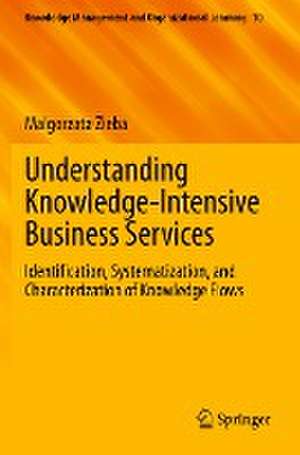Understanding Knowledge-Intensive Business Services: Identification, Systematization, and Characterization of Knowledge Flows: Knowledge Management and Organizational Learning, cartea 10
Autor Malgorzata Ziebaen Limba Engleză Paperback – 25 iun 2022
| Toate formatele și edițiile | Preț | Express |
|---|---|---|
| Paperback (1) | 637.59 lei 6-8 săpt. | |
| Springer International Publishing – 25 iun 2022 | 637.59 lei 6-8 săpt. | |
| Hardback (1) | 643.84 lei 6-8 săpt. | |
| Springer International Publishing – 24 iun 2021 | 643.84 lei 6-8 săpt. |
Preț: 637.59 lei
Preț vechi: 750.11 lei
-15% Nou
Puncte Express: 956
Preț estimativ în valută:
121.100€ • 127.72$ • 100.95£
121.100€ • 127.72$ • 100.95£
Carte tipărită la comandă
Livrare economică 07-21 aprilie
Preluare comenzi: 021 569.72.76
Specificații
ISBN-13: 9783030756208
ISBN-10: 3030756203
Ilustrații: XV, 222 p. 29 illus.
Dimensiuni: 155 x 235 mm
Greutate: 0.34 kg
Ediția:1st ed. 2021
Editura: Springer International Publishing
Colecția Springer
Seria Knowledge Management and Organizational Learning
Locul publicării:Cham, Switzerland
ISBN-10: 3030756203
Ilustrații: XV, 222 p. 29 illus.
Dimensiuni: 155 x 235 mm
Greutate: 0.34 kg
Ediția:1st ed. 2021
Editura: Springer International Publishing
Colecția Springer
Seria Knowledge Management and Organizational Learning
Locul publicării:Cham, Switzerland
Cuprins
1. Knowledge and Knowledge Management.- 2. Knowledge Transfer and Knowledge Flows.- 3. Knowledge-Intensive Business Services.- 4. KIBS Companies and Their Importance for Economy and Innovation.- 5. Knowledge Flows in KIBS Companies: Theoretical Framework and Study Description.- 6. Knowledge and Its Flows in the Light of Empirical Research.- 7. Discussion of the Research Results and Conclusions.
Notă biografică
Malgorzata Zieba is an Associate Professor of Management at Gdańsk University of Technology, Poland. She has been a research fellow within the Dekaban Liddle Fellowship Sheme at the University of Glasgow in 2012 and 2019. She has been a visiting lecturer at universities in Italy, Germany, Lithuania and Spain. She is the Vice-President and Board Member of the International Association for Knowledge Management (IAKM), and is a member of several conference committees, e.g.: European Conference on Knowledge Management, European Conference on Intellectual Capital, or International Conference on Intellectual Capital, Knowledge Management & Organisational Learning. She is the author of many publications, for example in Journal of Knowledge Management, Journal of Cleaner Production, Knowledge Management Research & Practice or Journal of Business Research. Her research interests focus on knowledge management, knowledge-intensive business services (KIBS), innovation management, and the development of knowledge-based economy.
Textul de pe ultima copertă
This book contributes to an improved understanding of knowledge-intensive business services and knowledge management issues. It offers a complex overview of literature devoted to these topics and introduces the concept of ‘knowledge flows’, which constitutes a missing link in the previous knowledge management theories. The book provides a detailed analysis of knowledge flows, with their types, relations and factors influencing them. It offers a novel approach to understand the aspects of knowledge and its management not only inside the organization, but also outside, in its environment.
Caracteristici
Introduces the concept of 'knowledge flows' and its importance to knowledge management literature Provides a deeper understanding of knowledge management in knowledge-intensive business services Identifies and characterizes knowledge flows within the organization as well as potential factors affecting these flows











